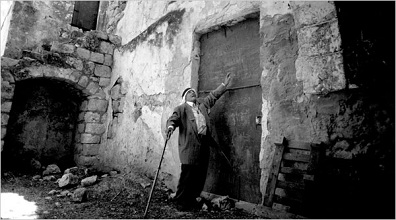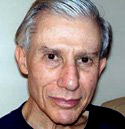Eroding Conditions for Israeli Arabs: Part II

Abu Abed, 84, returned recently to what remains of Hittin, the former Arab
village in northern Israel where he was born. He fled with his family in 1948.
(Rina Castelnuovo for The New York Times)
An earlier article reviewed the April Mossawa Advocacy Center for Arab Citizens in Israel report [.pdf] titled, "One Year for Israel's New Government and the Arab Minority in Israel," accessed through THIS link.
This article discusses a new Association for Civil Rights in Israel (ACRI) report titled, "Project Democracy - Fighting for the Ground Rules" for Israeli Arabs.
Israel's bogus democratic credentials are shameless and transparent, for growing numbers of Israeli Jews, but mainly for denying equal rights to minority Arabs, comprising 20% of the population. ACRI explained, saying:
"One of the most important principles in a democracy is to protect the minority against....tyranny. A democratic state is by nature pluralistic and respectful of diversity among its citizens, and enables each group within its population that so wishes to maintain all the components of its own identity, including its heritage, culture, and national identity."
Israel governs mirror opposite, disdaining anyone not Jewish, largely denying them any rights, while increasing harsh levels of persecution, especially against unwanted Arabs. As a result, today's reality is lawless discrimination, at times erupting in violence, injuries and deaths.
Arab citizens are increasingly persecuted because Israel won't "hesitate to employ lethal violence against" them on any pretext or none whatever. With no accountability or prosecutions, Muslims are unsafe, knowing their government is the enemy, not protector of their rights.
At the start of the second Intifada, the events of October 2000 shocked many by the murder of 13 Arabs, 12 citizens and one Occupied Territories resident. No prosecutions followed, a chilling reality that persists. As a result, fear and mistrust grow, instead of adopting the Or Commission's recommendations to diffuse them.
Established to investigate the October 2000 incidents, it gave Israel "a historic opportunity to redefine its attitude" to its Arab minority. Ten years later, nothing's changed. In fact, conditions are worse. "(I)n particular, we have seen an unprecedented deterioration in the attitude of the state toward (its) Arab citizens," more than ever since Israel's War of Independence treated them like a fifth column, an enemy to be routed and removed. Today that same attitude prevails.
Besides attacks on personal freedoms, authorities propose discriminatory laws, make racist statements publicly, exert force lawlessly, and most recently want Arabs to declare loyalty to "a Zionist, Jewish and democratic state," tarnishing or even made to renounce their own heritage in the process.
Moreover, since October 2000, "dozens of Arab citizens have been killed by the security forces." Rarely is anyone held accountable, at most offenders given "light penalties that do not reflect the gravity" of their crimes.
Democracies afford equal rights and protections to all its citizens, none excluded for any reason, the true test shown by how minorities are treated. Instead, since inception, Israeli Arabs "have faced systematic and institutionalized discrimination" and repression.
Importantly, as recognized by the Or Commission, not only do Arab citizens constitute a large minority, they represent an indigenous people with longstanding roots before Israel's establishment. As distinct from immigrants, they "bear a stronger affinity" to their historic homeland, international law recognizing their right to equality in all respects.
Yet an extremist Knesset demands "No citizenship without (pledged) loyalty," what no real democracy requires or enacts repressive measures against any of its citizens. Yet hardline Israelis believe Arab rights depend "on (the) condition that they abandon their national identity, culture, language, and historical heritage, and declare their 'loyalty' to values they do not share."
No "loyalty," no rights, they believe, including examples reflecting tyranny, not democracy, such as denying:
● free expression;
● nonviolent protests; and
● participation in social and political life.
An example of the latter came from the early 2009 Central Election Committee (CEC) decision to disqualify two Arab parties (Balad and the United Arab List) from standing for Knesset elections. Although Israel's Supreme Court overturned the action, CEC's conduct "constituted an attack not only on the Arab minority itself, but also on the democratic system," exposing its sham nature.
Numerous other examples also highlight it, including events after the May Gaza Flotilla attack, unleashing "a tidal wave of attacks and challenges to the Arab Members of the Knesset."
A proposed "Zuabi Law" was introduced, connected to MK Hanin Zuabi's participation. It stipulated that by a special 80 MK majority, any Knesset member could be expelled for having "committed incitement and negated the existence of the State of Israel as a Jewish and democratic state." So far, it's not enacted, but indicates the fragility of personal freedom in Israel, fast eroding and heading for tyranny.
This and other examples reflect "the unprecedented deterioration in the current Knesset in all aspects relating to respect for the democratic process." Its most fundamental precept protects the right to dissent, what Howard Zinn called the highest form of patriotism.
It also prohibits state-sponsored violence, what Israel uses against its Arab minority, including Bedouin citizens, forcefully removed from their lands with no right to contest. Worse still is cold-blodded murder with no accountability except for meaningless hand slaps.
As a result, the attitude of authorities becomes "a role model for many members of the (Jewish) public. The disrespect (and lawlessness) shown by (MKs);" the hostile approach of security force harshness; "the state's denial of the rights of the Arab minority, its preference for (force) over dialogue, and its treatment of Arab citizens" like enemies influences public attitudes and behavior overall.
Surveys and other expressions, in fact, confirm an "atmosphere of hostility, hatred, and racism." Countless examples include:
● in 2009, three Misgav district communities (Manof, Yuvalim and Mitzpe) required candidates for membership to declare loyalty to the "Zionist vision" and Israel as a Jewish, democratic state;
● in July 2010, a proposed law passed its First Reading to let communities make these demands;
● discriminatory racism is common in workplaces, at times prohibiting Arabic being used; in other cases excluding non-Jews; "out of 150,000 employees in the industry in Israel, only some 500 (0.33 percent) are Arabs; and
● overall treating Arab citizens like enemies, at times violently.
Since inception, government decisions, court rulings, and official documents confirm a culture of discrimination against anyone not Jewish, especially Muslims. The Or Commission, in fact, found that:
"government attention to the Arab sector has largely been characterized by neglect and discrimination." [Moreover,] "the establishment has not shown sufficient sensitivity to the needs of the Arab sector, and has not taken adequate action to allocate state resources in an egalitarian manner, including to this sector."
The Commission recommended genuine equality for Israeli Arabs, saying:
"The state should initiate, develop, and operate programs to close gaps, with an emphasis on the fields of budgets, in all areas relating to education, housing, industrial development, employment, and services."
Nonetheless, discriminatory gaps widened in areas of education, land, housing, construction, employment, healthcare, politics, civil liberties, and personal safety. Israel institutionalized second-class citizenry for everyone not Jewish, mainly Muslims. ACRI thus concluded, saying:
"This reality is morally intolerable and, ultimately, it threatens not 'merely' " Israel's 20% minority, "but all of us....A state that restricts" basic rights; allocates them unfairly; "discriminates against citizens (by misallocation) of resources, infrastrutures, and education; and that labels certain citizens as enemies, is a state" with no democratic legitimacy whatever, heading rapidly toward despotism.
A Final Comment
Israel's huge political prisoner population belies any democratic pretense, Ahmad Sa'adat a prominent prisoner of conscience, discussed in an earlier article, accessed through THIS link.
On December 8, 2008, he was sentenced to 30 years imprisonment, Israel's harshest political punishment, illegal under international law.
An early October 2010 article updated his status, accessed in a final comment through THIS link.
It mentioned an October 4 International Campaign for the Release of Kidnapped Palestinian Legislators press release, saying Sa'adat spent over "500 days in solitary confinement under the most inhumane conditions...."
On October 21, Israel sentenced him to six additional months of isolation until April 21, 2011, the web site freeahmadsaadat.org calling it:
"another outrage and attack upon the humanity of Palestinian prisoners and the Palestinian people. (His) ongoing and repeated isolation (will) now stretch to over two years" to silence him on grounds of "security."
In fact, it's to crush his human rights mission and perhaps kill him by repression and neglect. The campaign to free him "calls upon all to confront this outrage," adding that "Isolation will not silence" him, other Palestinian political prisoners, or their cause.
___________________________________________________________________________________

Stephen Lendman: I was born in 1934 in Boston, MA. Raised in a modest middle class family, attended public schools, received a BA from Harvard University in 1956 and an MBA from the Wharton School at the University of PA in 1960 following 2 years of obligatory military service in the US Army. Spent the next 6 years as a marketing research analyst for several large US corporations before becoming part of a new small family business in 1967, remaining there until retiring at the end of 1999. Have since devoted my time and efforts to the progressive causes and organizations I support, all involved in working for a more humane and just world for all people everywhere, but especially for the most needy, disadvantaged and oppressed. My efforts since summer 2005 have included writing on a broad range of vital topics ranging from war and peace; social, economic and political equity for all; and justice for all the oppressed peoples of the world like the long-suffering people of Haiti and the Palestinians. Also co-hosting The Global Research News Hour, occasional public talks, and frequent appearances on radio and at times television.
Stephen Lendman is a Research Associate of the Centre for Research on Globalization. He lives in Chicago and can be reached at lendmanstephen@sbcglobal.net. Also visit his blog site sjlendman.blogspot.com and listen to The Lendman News Hour on RepublicBroadcasting.org Monday - Friday at 10AM US Central time for cutting-edge discussions with distinguished guests on world and national issues. All programs are archived for easy listening.
___________________________________________________________________________________
URL: http://www.a-w-i-p.com/index.php/2010/11/05/eroding-conditions-for-israeli-arabs-par
























